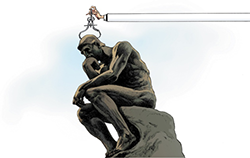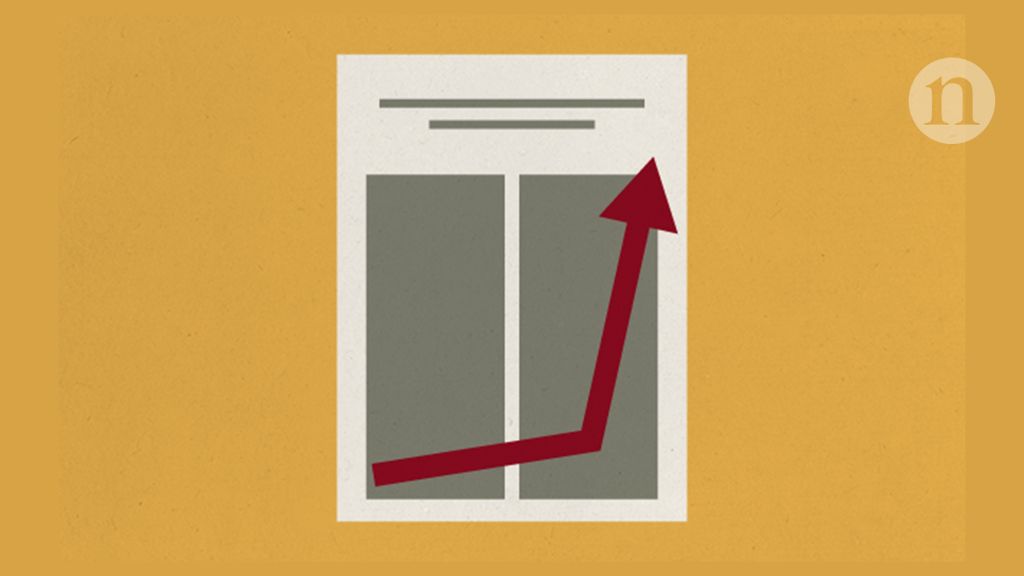Send us a link
Citation Gaming Induced by Bibliometric Evaluation: A Country-level Comparative Analysis
Citation Gaming Induced by Bibliometric Evaluation: A Country-level Comparative Analysis
Article proposes a new inwardness indicator able to gauge the degree of scientific self-referentiality of a country. A comparative analysis of the trends for the G10 countries in the years 2000-2016 reveals a net increase of the Italian inwardness.
Meta-Research: Use of the Journal Impact Factor in Academic Review, Promotion, and Tenure Evaluations
Meta-Research: Use of the Journal Impact Factor in Academic Review, Promotion, and Tenure Evaluations
Almost a quarter of faculty evaluation documents from US and Canadian universities mention Journal Impact Factor and often imply that it measures research quality.
A Call for Funders to Ban Institutions That Use Grant Capture Targets
Grant capture is often used as a formal metric for academic evaluation. The author argues that this practice has led to perverse incentives for researchers and institutions and that research funders have both a responsibility and a significant interest in using their influence to halt this practice.

2019 Scholar Metrics Released
Scholar Metrics provide an easy way for authors to quickly gauge the visibility and influence of recent articles in Google Scholar publications.
Interdisciplinary Comparison of Scientific Impact of Publications Using the Citation-Ratio
Interdisciplinary Comparison of Scientific Impact of Publications Using the Citation-Ratio
Article shows that the Citation-Ratio is more consistent across disciplines than total numbers of citations.
How a Single Paper Affects the Impact Factor: Implications for Scholarly Publishing
How a Single Paper Affects the Impact Factor: Implications for Scholarly Publishing
Study finds high Journal Impact Factor (JIF) volatilities for hundreds of journals annually due to their top-cited paper.
The Significant Difference in Impact
This paper analyses usage statistics, citation data and altmetrics from a university press publishing open access monographs. The data suggests, despite the small sample, that authors can to a greater extent influence how their book is discovered by the readership.
Interdisciplinary Comparison of Scientific Impact of Publications Using the Citation Ratio
Interdisciplinary Comparison of Scientific Impact of Publications Using the Citation Ratio
Article concludes that the Citation Ratio is a useful and promising tool for comparing scientific impact of publications across disciplines and potentially for interdisciplinary works.
How Journals and Publishers Can Help to Reform Research Assessment
How Journals and Publishers Can Help to Reform Research Assessment
It is well established that administrators and decision-makers use journal prestige and impact factors as a shortcut to assess research. But it is not enough to recognize the problem. Identifying specific approaches that publishers can take to address these concerns really is key.

The "Impact" of the Journal Impact Factor in the Review, Tenure, and Promotion Process
The "Impact" of the Journal Impact Factor in the Review, Tenure, and Promotion Process
The Journal Impact Factor has been widely critiqued as a measure of individual academic performance. However, it is unclear whether these criticisms and high profile declarations, such as DORA, have led to significant cultural change.

Impact Factors Are Still Widely Used in Academic Evaluations
Survey finds that 40% of research-intensive universities mention the controversial metric in review documents - despite efforts to dampen its influence.

World Impact Rankings
The Times Higher Education University Impact Rankings assess universities against the United Nations' Sustainable Development Goals. Calibrated indicators are used to provide comprehensive and balanced comparisons across three broad areas: research, outreach, and stewardship. This first edition includes more than 450 universities from 76 countries.
Elsevier Chief: End Citation Fixation to Halt 'salami Publishing'
YS Chi claims publisher's shift to recognise research quality over quantity left a void that has been filled by others happy to publish insubstantial work

How to Shine in Indonesian Science? Game the System
Indonesia researchers have inflated their Indonesia’s Science and Technology Index (SINTA) score by publishing large numbers of papers in low-quality journals, citing their own work excessively, or forming networks of scientists who cited each other.

CWTS Launches New Course on Responsible Metrics
CWTS announces the launch of the new course called "Responsible Metrics for Research Evaluation".

Elsevier Acquires Science-Metrix Inc., Provider of Research Analytics Services and Data
Elsevier Acquires Science-Metrix Inc., Provider of Research Analytics Services and Data
Elsevier, the information analytics business specializing in science and health, has acquired Science-Metrix Inc., a research evaluation firm that provides science research evaluation and analytics to assess science and technology activities
Netherlands Considers Creating Faculty Positions Based on Teaching, Not Research Metrics
Netherlands Considers Creating Faculty Positions Based on Teaching, Not Research Metrics
The Netherlands plan a shift away from evaluating faculty members only on research metrics. This move would also make it possible to be hired on the basis of teaching.
Google Scholar Citation Profiles: the good, the bad, and the better
Reference Implementation for Open Scientometric Indicators
Within the project "Reference implementation for Open Scientometric Indicators" (ROSI), new assessments and visualizations of conventional and alternative metrics (altmetrics) will be developed and their effect on researchers will be investigated. For this purpose, a reference implementation based on the open source research information system VIVO will be developed in which various metrics are combined with data from different openly licensed sources. In order to develop the requirements of the target groups, surveys are going to be conducted to investigate the effect of scientometric indicators on scientist's and their expectations regarding those indicators. The objectives of the project are firstly to evaluate the scientometric needs and concerns of the target groups, and secondly to implement a usable reference implementation of a toolset that reflects the results of the study and that enables transparent, license-free, flexibly adaptable analysis of the output of researchers, contributors and organisations.
Why (almost) Everything We Know About Citations is Wrong: Evidence from Authors
Why (almost) Everything We Know About Citations is Wrong: Evidence from Authors
Although citations and related metrics like the H-index are widely used in academia to evaluate research and allocate resources, the referencing decisions on which they are based are poorly understood. This paper investigates whether authors reference works that influenced them most or those they believe the readers will value most.
Craft Metrics to Value Co-production
To assess whether research is relevant to society, ask the stakeholders, say Catherine Durose, Liz Richardson and Beth Perry.

An Index to Quantify an Individual's Scientific Leadership
The h-index has gained wide acceptance as a bibliometric indicator of individual scientific achievement. In this paper, J. E. Hirsch proposes an alternative to replacing the h-index with a better index, the h-alpha-index, to address at least some of its deficiencies.
Visualizing the research ecosystem of ecosystem research via Wikidata
Using Scholia as a starting point for exploring how information about biodiversity and ecosystem research is represented in Wikidata and how it can be explored, curated and reused.


